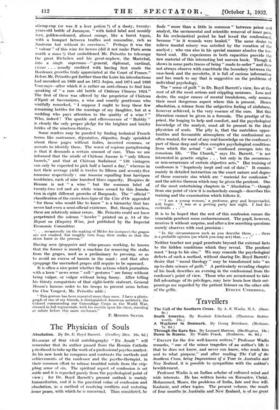The Physician of Souls
Absolution. By Dr. E. Boyd Barrett. (Geoffrey Bles. 10s. CA.) READERS of that vivid autobiography "Ex • :Jesuit " will remember that its author passed from the -Roman Catholic yriesthood to take up the work of a professional psycho-analyst. In his new book he compares and contrasts the methods and achievements of the confessor and the Psycho-therapist, in their common effort to release troubled minds from the crip- „pling sense of sin. The spiritual aspect of confession is set aside and it is regarded purely from the psychological point of view ; for Dr. Boyd Barrett's present outlook is -mainly humanitarian, and it is the practical value of confession and absolution, as a method of resolving conflicts and restoring ,inner peace, with which he is concerned, Thus considefed, he finds " more than a little in common " between priest and analyst, the sacramental and scientific removal of inner pain, In his ecclesiastical period he had loved the confessional, because "In it wounds were healed." The same desire to .relieve mental misery was satisfied by the vocation of the
analyst ; who can also in his special manner absolve the tor- tured soul. His experiences in both capacities provide the raw material of this interesting but uneven book. Though it shows in some parts traces of being " made to order " and does not always observe, with exactitude the boundary between the case-book and the novelette, it is full of curious information and has much to say that is suggestive on the problems of individual psychology.
The " sense of guilt " in Dr. Boyd Barrett's view, lies at the root of all the most serious and crippling neuroses. Loss and
desire, the major causes of mental breakdown, only assume their most dangerous aspect. where this is present. Hence absolution, a release from the subjective feeling of sinfulness, however achieved, is the very essence of the cure. But this liberation cannot be given in a formula. The prestige of the priest, the longing to help and comfort, and the psychological knowledge of the analyst, must all be present in the ideal physician of souls. The pity is, that the matchless oppor- tunities and favourable atmosphere of the confessional are often wasted, for want of any real knowledge on the confessor's
part of those deep and often complex psychological conditions from which the actual " sin " confessed emerges into the conscious life. " The Church," says Dr. Barrett, " is not interested in genetic origins . . . but only in the occurrence or non-occurrence of certain objective acts." Her training of confessors is " hopelessly inept and out of date:" It consists mainly in detailed instruction on the exact nature and degree of those concrete sins which are " material for confession " and the advice thereon which may be given the penitent. One of the most entertaining chapters in " Absolution "—though from one point of view it is melancholy enough—describes this training and the examination which follows it.
" I am a young woman,' a professor, grey and bespectacled, will begin. ' I was at a petting party last night. I had fivo cocktails. . . "
It is to be hoped that the rest of this confession causes the venerable penitent some embarrassment. The pupil, however, receives it without surprise, and after a few searching questions merely observes with cool precision :
" In the circumstances such as you describe them . . . there is a probable opinion (on which you may act) that. . . ."
Neither teacher nor pupil penetrate beyond the external facts to the hidden conditions which they reveal. The penitent must " keep to his sins." We may concede the psychological defects of such a method, without sharing Dr. Boyd Barrett's desire that " moral theology " may be transformed into " an up-to-date science of guilt." A particularly revealing chapter of his book describes an evening in the confessional from the confessor's point of view. Those who are accustomed to take full advantage of its privileges, may here learn how their out- pourings are regarded by the patient listener on the other side














































 Previous page
Previous page